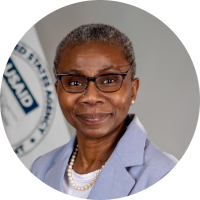Peacebuilding Architectures and Institutions - What Works?
On July 11, 2017, the Wilson Center Africa Program hosted a panel discussion on “Peacebuilding Architectures and Institutions – What Works?” as part of the 2017 annual Southern Voices Network for Peacebuilding conference. The event featured three speakers, Mr. Gustavo de Carvalho, Senior Researcher, Peace and Operations Division, Institute for Security Studies (ISS); Dr. Ibrahim Wani, Independent Consultant and former Director of the Human Rights Division at the UN Mission in South Sudan (UNMISS) and representative of the UN High Commissioner for Human Rights in the Republic of South Sudan; and Professor Narnia Bohler-Muller, Executive Director, Democracy, Governance and Service Delivery Research Programme, Human Sciences Research Council (HSRC). The panelists examined the effectiveness of Africa’s peacebuilding architectures and institutions, offered recommendations for increasing the efficacy of current approaches, and explored how Africa’s peacebuilding architectures operate within a global context.
Mr. Gustavo de Carvalho discussed the African Union’s (AU) emerging role as a leader in peace and security issues in Africa, highlighting the AU’s increased leadership in peacebuilding, its current engagement in self-reflection on its role, and its ongoing reform process aimed at streamlining and improving responses to conflict. He noted that while there is consensus that conflict is expensive and that prevention is morally right, smart, and economically sound, it remains difficult to persuade stakeholders to take action. In response, Mr. de Carvalho remarked on key trends of this debate, particularly the issue of linearity in peacebuilding responses. According to Mr. de Carvalho, responses are framed around discrete (linear) stages in the post-conflict process: peacebuilding, peacemaking, and peacekeeping. Mr. de Carvalho argued that peacebuilding architectures must see all post-conflict processes as occurring simultaneously (non-linear). He highlighted the disparity in funding for peacebuilding versus conflict response in the AU and UN budgets as areas of weakness. Mr. de Carvalho offered several recommendations for increasing the effectiveness of Africa’s architectures, including identifying the benchmarks of success more concretely, assessing the timing of interventions for better implementation and reach, and ensuring that states empower organizations to implement effective mechanisms for peacebuilding in Africa.
Dr. Ibrahim Wani analyzed the human rights dimensions of peacebuilding in Africa, focusing on the progress made towards preventing human rights violations and possible ways forward. Dr. Wani first applauded the successful inclusion of normative frameworks and human rights policies in existing United Nations peacekeeping missions. Dr. Wani suggested that this trend reflects the growing awareness of the importance of human rights, which he argues was spurred by the lack of response to the Rwandan Genocide. Furthermore, Dr. Wani claimed that the inclusion of human rights frameworks shows a recognition of the realities of conflict. Dr. Wani stated that despite the international community’s resolution to address human rights violations, serious action is rarely taken, which is due to the capacity challenges faced by peacekeeping missions, the ambiguity of the concept of human rights, and the lack of tools available to concretely address the violations. Dr. Wani offered recommendations for enhancing peacebuilding architectures, including: 1) continue to strengthen mindsets regarding the critical role of human rights in peacebuilding, and developing a coherent viewpoint of human rights – focusing on local, regional, and sub-regional level; 2) advancing the understanding of human rights issues, and developing additional tools to ensure effective action and accountability when addressing human rights violations within Africa’s peacebuilding architectures.
Professor Narnia Bohler-Muller focused on role of the International Criminal Court (ICC) in African peacebuilding architectures. Using the case of South Africa’s failure to arrest Sudanese President Omar al-Bashir, Professor Bohler-Muller discussed arbitrary power and populism in relation to the Rome Statute and peacebuilding. She claimed that the South African Government’s argument—that its role in peacekeeping precluded it from arresting a sitting Head of State—was an incorrect interpretation of the Statute, and therefore should prevent South Africa from withdrawing from the ICC as it has threatened. Professor Bohler-Muller suggested that political solutions often create never-ending cycles of political problem that do address core issues. Moreover, due to impunity, protecting Heads of State often escalates conflicts rather than ending them, making respect for rule of law paramount in efforts to counter arbitrary power. Professor Bohler-Muller recommended that members of the ICC comply with the Rome Statute, that all stakeholders remain aware of power differentials in Africa to check power, that Africa strengthens domestic judiciaries, that a permanent, African regional criminal court replace ad hoc tribunals, and that South Africa not withdraw its ICC membership.
The Southern Voices Network for Peacebuilding (SVNP) is a continent-wide network of African policy and research organizations that works with the Africa Program to bring African analyses and perspectives to key issues in U.S.-Africa relations. Funded by the Carnegie Corporation of New York since 2011, the project provides avenues for African researchers to engage with, inform, and exchange perspectives with U.S. and international policymakers in order to develop the most appropriate, cohesive, and inclusive policy frameworks for the issues of peacebuilding and state-building in Africa.
Speakers
Moderator

Hosted By

Africa Program
The Africa Program works to address the most critical issues facing Africa and US-Africa relations, build mutually beneficial US-Africa relations, and enhance knowledge and understanding about Africa in the United States. The Program achieves its mission through in-depth research and analyses, public discussion, working groups, and briefings that bring together policymakers, practitioners, and subject matter experts to analyze and offer practical options for tackling key challenges in Africa and in US-Africa relations. Read more
